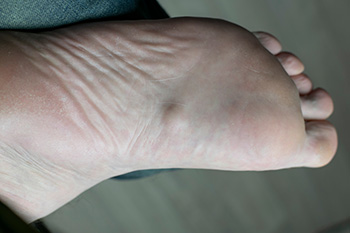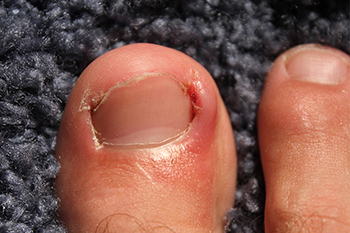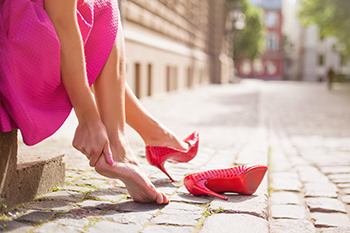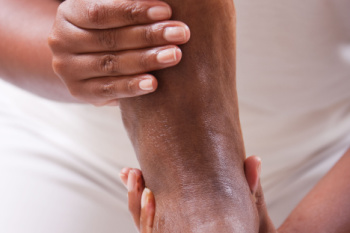Items filtered by date: February 2025
Do You Suffer From Painful Feet?
What Is Plantar Fibromatosis?

Plantar fibromatosis is a rare condition that affects the tissue on the bottom of the foot, causing the growth of benign nodules or lumps in the plantar fascia. These lumps are usually firm and may vary in size. The exact cause of plantar fibromatosis is not fully understood, but it may be linked to genetic factors, trauma, or certain health conditions like diabetes or liver disease. Symptoms typically include pain or discomfort in the foot, especially when walking or standing for extended periods. The lumps may gradually increase in size, leading to difficulty in movement or wearing shoes. While the condition is generally not harmful, it can cause significant discomfort. If you lump the sole of your foot, it is suggested that you consult a podiatrist who can provide effective relief and treatment solutions.
A plantar fibroma may disrupt your daily activities. If you have any concerns, contact Philip Hahn, DPM of Advanced Foot & Ankle Center. Our doctor can provide the care you need to keep you pain-free and on your feet.
Plantar Fibroma
A plantar fibroma is a fibrous knot in the arch of the foot. It is embedded in the plantar fascia which is a band of tissue that extends from the heel to the toes along the bottom of the foot. There can be multiple plantar fibromas in the feet at the same time. There are no known causes for this condition. If you have a plantar fibroma, there will be a bump in the arch of your foot that cannot be missed. Any associated pain is most often due to a shoe rubbing against the nodule. Non-surgical options, such as steroid injections, physical therapy, and orthotics should be tried first. Surgery is a last resort and is the only thing that will remove a plantar fibroma entirely. Consult with a podiatrist for a proper diagnosis and to determine the treatment regimen that is right for you.
What Causes a Plantar Fibroma?
While there are no specific causes identified, a plantar fibroma can possibly come from genetic predisposition or the formation of scar tissue that forms from healing the tears in the plantar fascia.
What Are the Symptoms of a Plantar Fibroma?
There will be a noticeable lump in the arch of the foot that may or may not cause pain. If pain is felt, it is typically because a shoe is rubbing up against the lump or when walking or standing barefoot.
Treatment and Prevention
A plantar fibroma will not disappear without treatment, but it can get smaller and be a non-issue. If pain persists, a podiatrist examines the foot and when the arch of the foot is pressed, pain can be felt down to the toes. An MRI or biopsy might be performed to help diagnose or evaluate the plantar fibroma. The following non-surgical options are generally enough to reduce the size and pain of these nodules:
- Steroid injections
- Orthotics
- Physical therapy to help apply anti-inflammatory creams on the bump
Surgery is considered if the mass increases in size and the patient continues to feel pain after non-surgical methods are tried.
If you have any questions please feel free to contact our office located in Texarkana, TX . We offer the newest diagnostic tools and technology to treat your foot and ankle needs.
Nail Growth and Ingrown Toenails

An ingrown toenail might seem minor at first, but when ignored, it can turn into a painful, swollen mess. It happens when the edge of the nail digs into the surrounding skin, often due to improper trimming, wearing tight shoes, or natural nail shape. At first, it might just be discomfort, but as the skin becomes irritated, redness, swelling, and even infection can develop. People who are on their feet all day, athletes, and those with thicker or curved nails are more prone to ingrown toenails. The biggest mistake that many people make is trying to treat it at home, which often worsens the problem. If you have a painful ingrown toenail, it is suggested that you see a podiatrist who can effectively treat this condition.
Ingrown toenails can become painful if they are not treated properly. For more information about ingrown toenails, contact Philip Hahn, DPM of Advanced Foot & Ankle Center. Our doctor can provide the care you need to keep you pain-free and on your feet.
Ingrown Toenails
Ingrown toenails occur when a toenail grows sideways into the bed of the nail, causing pain, swelling, and possibly infection.
Causes
- Bacterial infections
- Improper nail cutting such as cutting it too short or not straight across
- Trauma to the toe, such as stubbing, which causes the nail to grow back irregularly
- Ill-fitting shoes that bunch the toes too close together
- Genetic predisposition
Prevention
Because ingrown toenails are not something found outside of shoe-wearing cultures, going barefoot as often as possible will decrease the likeliness of developing ingrown toenails. Wearing proper fitting shoes and using proper cutting techniques will also help decrease your risk of developing ingrown toenails.
Treatment
Ingrown toenails are a very treatable foot condition. In minor cases, soaking the affected area in salt or antibacterial soaps will not only help with the ingrown nail itself, but also help prevent any infections from occurring. In more severe cases, surgery is an option. In either case, speaking to your podiatrist about this condition will help you get a better understanding of specific treatment options that are right for you.
If you have any questions please feel free to contact our office located in Texarkana, TX . We offer the newest diagnostic and treatment technologies for all your foot and ankle needs.
Impact of Heel Height and Base on Foot Health

Heel height, heel base, and insole design significantly influence foot health and comfort. High heels can cause undue pressure on the ball of the foot, leading to pain, calluses, and even long-term deformities like bunions or hammertoes. Lower heels, those under two inches, are generally safer, reducing stress on the arch and heel. A wide, stable heel base offers better balance and reduces the risk of ankle sprains, especially in uneven terrain or prolonged standing situations. Narrow heels, like stilettos, increase instability and strain the foot muscles. Insoles play an important role by providing cushioning, arch support, and shock absorption, which are essential for minimizing discomfort and preventing injuries. Orthotic insoles can address specific issues like plantar fasciitis or flat feet. For personalized advice on footwear that supports your unique needs, it is suggested that you consult a podiatrist to ensure optimal foot health.
High heels have a history of causing foot and ankle problems. If you have any concerns about your feet or ankles, contact Philip Hahn, DPM from Advanced Foot & Ankle Center. Our doctor can provide the care you need to keep you pain-free and on your feet.
Effects of High Heels on the Feet
High heels are popular shoes among women because of their many styles and societal appeal. Despite this, high heels can still cause many health problems if worn too frequently.
Which Parts of My Body Will Be Affected by High Heels?
- Ankle Joints
- Achilles Tendon – May shorten and stiffen with prolonged wear
- Balls of the Feet
- Knees – Heels cause the knees to bend constantly, creating stress on them
- Back – They decrease the spine’s ability to absorb shock, which may lead to back pain. The vertebrae of the lower back may compress.
What Kinds of Foot Problems Can Develop from Wearing High Heels?
- Corns
- Calluses
- Hammertoe
- Bunions
- Morton’s Neuroma
- Plantar Fasciitis
How Can I Still Wear High Heels and Maintain Foot Health?
If you want to wear high heeled shoes, make sure that you are not wearing them every day, as this will help prevent long term physical problems. Try wearing thicker heels as opposed to stilettos to distribute weight more evenly across the feet. Always make sure you are wearing the proper shoes for the right occasion, such as sneakers for exercising. If you walk to work, try carrying your heels with you and changing into them once you arrive at work. Adding inserts to your heels can help cushion your feet and absorb shock. Full foot inserts or metatarsal pads are available.
If you have any questions please feel free to contact our office located in Texarkana, TX . We offer the newest diagnostic and treatment technologies for all your foot and ankle needs.
Good Foot Hygiene is Key to Healthy Feet

Maintaining proper foot hygiene is essential for overall foot health. Daily washing with soap and warm water removes dirt, bacteria, and sweat, preventing unpleasant odors and infections like athlete’s foot. Thoroughly drying feet, especially between the toes, reduces moisture that can encourage fungal growth. Regularly trimming toenails straight across prevents ingrown nails, while moisturizing keeps skin soft and prevents cracks that could invite infection. Wearing clean socks and breathable shoes minimizes the risk of bacterial buildup and blister formation. Inspecting your feet regularly helps detect issues like cuts, swelling, or discoloration early. Good foot hygiene is especially critical for people with diabetes or poor circulation to avoid serious complications. If problems like persistent pain, wounds, or if infections occur, it is suggested that you consult a podiatrist for professional care and tailored treatment.
Everyday foot care is very important to prevent infection and other foot ailments. If you need your feet checked, contact Philip Hahn, DPM from Advanced Foot & Ankle Center. Our doctor can provide the care you need to keep you pain-free and on your feet.
Everyday Foot Care
Often, people take care of their bodies, face and hair more so than they do for their feet. But the feet are a very important aspect of our bodies, and one that we should pay more attention to. Without our feet, we would not be able to perform most daily tasks.
It is best to check your feet regularly to make sure there are no new bruises or cuts that you may not have noticed before. For dry feet, moisturizer can easily be a remedy and can be applied as often as necessary to the affected areas. Wearing shoes that fit well can also help you maintain good foot health, as well as making it easier to walk and do daily activities without the stress or pain of ill-fitting shoes, high heels, or even flip flops. Wearing clean socks with closed shoes is important to ensure that sweat and bacteria do not accumulate within the shoe. Clean socks help to prevent Athlete’s foot, fungi problems, bad odors, and can absorb sweat.
If you have any questions please feel free to contact our office located in Texarkana, TX . We offer the newest diagnostic and treatment technologies for all your foot and ankle needs.





